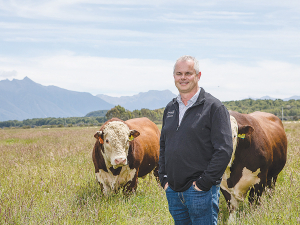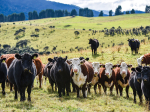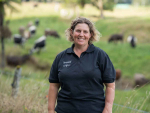Angus, Hereford and Simmental bull breeders are being encouraged to nominate sires for use in an innovative beef programme.
The Informing New Zealand Beef (INZB) programme is seeking bulls for the next mating season on Pamū’s Kepler farm near Te Anau and Lochinver Station near Taupo.
Dr Jason Archer, genetics specialist at Beef+Lamb New Zealand and INZB science lead, says the Beef Progeny Test (BPT) allows breeds to be compared as well as bulls.
“It enables B+LNZ Genetics to evaluate good bulls on the same level playing field, while demonstrating the differences and similarities between the breeds as well as the benefits of hybrid vigour.
“The BPT plays a key role in strengthening New Zealand’s beef industry for the benefit of all farmers.”
Breeders of bulls selected for use in the BPT will be provided with detailed information about the performance of their bull’s progeny, including processing data (in the case of steers).
The INZB BPT builds on data gathered from the previous Beef Progeny Test, with mating carried out between 2014- 2020 on several largescale commercial cattle operations throughout the country, says Archer.
Lochinver Station joined the programme as a Progeny Test host farm last year, and in January this year, around 600 Angus cows were artificially inseminated using Angus, Hereford and Simmental bulls.
For Lochinver Station, becoming a Progeny Test site for the INZB programme provides benefits for the farm business and the wider industry.
“We’re a progressive farm with a strong focus on beef production and so we are pleased and proud to be a part of something that will help build a stronger beef industry in New Zealand,” says Steve Smith, business manager at the 9500ha sheep and cattle farm, which is on the Rangitaiki Plains near Taupo.
“We get provided with data on the growth, fertility and carcase traits.
“That will help us on farm to identify how we could introduce different breeds of bulls and create hybrid vigour to produce more efficient cattle.”
Lochinver’s inclusion in the programme allowed Simmental genetics to be included in the BPT for the first time. While Simmentals are typically used as a terminal sire in this country, Archer says the breed is commonly used in maternal crossbred cows in other parts of the world.
He says there are maternal lines of Simmental available in this country which are suitable for use in a maternal crossbreeding programme.
On Kepler farm, Hereford and Angus cows are run side-by-side with crosses undertaken both ways.
Bull owners can nominate their bulls through the online nomination form.
Nominations close on August 25.


















